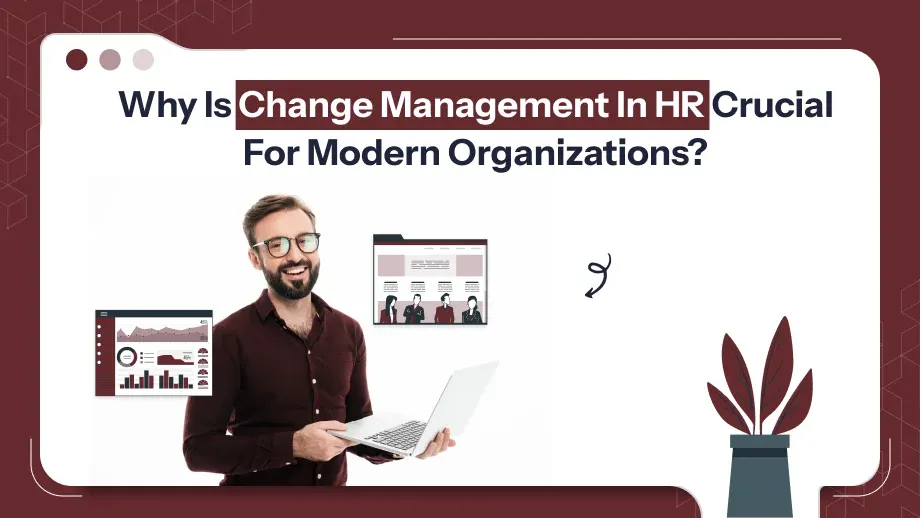
Change is not a challenge in today’s fast environment of business; it is an opportunity. If such change is made with the right strategies by any organization, then it can unlock new potential for it and stay ahead. That’s where Change Management in HR becomes indispensable.
HR training is the backbone of smooth transitions, with employees being taken care of and disruptions kept at bay, thus allowing new initiatives to be integrated into the organizational fabric. This blog will try to reveal the role of HR Training in Change Management, look at its effect on organizational success, and then provide actionable insights on how to make every transition a smooth one.
What is Change Management in HR?
Change Management in HR refers to the strategies and processes that make it possible for employees and the organization to shift through changes, such as restructuring, new technologies, or changes in the workplace culture. It is the framework of making people, processes, and systems change in harmony with organizational goals when there is transformation.
The role of HR in change management is central. HR professionals focus on guiding employees through changes, minimizing resistance, and ensuring the organization continues to function effectively. From communicating changes to managing employee training, HR serves as the bridge between organizational objectives and workforce adaptation.
Why is Change Management in HR Important?
Adaptation to Evolving Work Environments
As industries evolve with technological advancements and global challenges, organizations must stay flexible. HR ensures employees are equipped to adapt to new roles, workflows, or tools, using strategies like hr change management to address resistance and promote acceptance.
Maintaining Employee Morale
Poorly managed change can lead to uncertainty and reduced morale. HR and change management practices help create transparent communication and provide support systems to alleviate employee concerns, fostering trust during transitions.
Ensuring Business Continuity
Effective change management hr strategy minimizes disruptions to operations. HR ensures that transitions, whether strategic or operational, are seamless, allowing businesses to continue achieving their goals.
Key Components of Change Management in HR
Clear Communication
Communication is the cornerstone of successful Change Management in HR. Transparent, timely updates about changes ensure employees understand the reasons behind transformations, reducing confusion and resistance.
Training and Development
Upskilling employees to meet the requirements of change is vital. For instance, adopting new tools like cloud based hrms software may require training sessions to help employees get comfortable with the technology.
Employee Involvement
Employee involvement can increase buy-in and reduce resistance. Feedback mechanisms allow employees to voice their concerns and offer suggestions, fostering a collaborative environment.
Leadership Support
Leading Change: HR’s role also includes getting the leadership aligned with change initiatives. Strong leadership ensures that there is consistency and unity of message and direction, hence creating more comfortability from the employee perspective.
Monitoring and Feedback
Frequent monitoring of the progress of the change initiatives ensures necessary changes can be made by the organizations. HR offers analytics on success metrics with the best HRMS and payroll software in India.
Transform your organization with powerful Change Management in HR!
Ensure smooth transitions, boost employee support, and drive success with effective HR strategies.
Challenges in Change Management
Implementing change isn’t without obstacles. Common challenges include:
- Resistance to Change: Employees may feel uncomfortable or unsure about new practices.
- Insufficient Training: A lack of preparation can hinder employees’ ability to adapt.
- Cultural Shifts: Transforming workplace culture requires careful planning and consistent messaging.
Overcoming these challenges requires a mix of strategic communication, robust training programs, and tools like payroll and HRMS to streamline the process.
How Does HR Contribute to Change Management?
HR has a crucial role in implementing changes in an organization with minimum disturbances and resistance. Change Management by HR is an efficient method of managing the workforce for better alignment with new goals and strategies of the company. It serves as a communication bridge between the management and the employees to develop trust and openness during organizational change.
Facilitating Communication
Good communication is imperative to effective change management. This includes ensuring the employees know why the changes are made, their role in that, and the result expected of it. Communication comes through either in town hall meetings, through email, or individual discussions; this way, HR ensures messages get across to all employees very clearly.
Aligning Leadership with Change Goals
HR ensures that leadership teams are united and aligned with the organization’s change objectives. This unified direction sets a clear tone for employees and strengthens trust in the process. HR leadership plays a crucial role in guiding this alignment, fostering collaboration, and ensuring that the change strategy is effectively communicated and supported at all levels of the organization.
Training and Upskilling Employees
Preparing employees for new roles, technologies, or workflows is one of the vital aspects of what is change management in HR. HR organizes training sessions and development programs to help employees adapt. For instance, training employees in using cloud-based HRMS software will be necessary to aid in a smooth transition.
Managing Resistance to Change
They fear changes and discomfort when working with new systems and processes. Because this is perceived and experienced, HR addresses such fears by opening dialogues and providing reassurances while involving employees in such decisions. This way, relations are built, and resistance is reduced.
Monitoring Progress and Gathering Feedback
HR tracks the progress of change initiatives and gathers feedback from employees to identify areas for improvement. Tools like hr software india for small businesses and the best HRMS tools provide insights into how changes are being received and where adjustments are needed.
Types of Change Management
Change management comes in different forms, depending on the scale and nature of the organizational transformation. Understanding the types of change management helps HR teams prepare better and adopt the right strategies for each situation.
Organizational Change
It encompasses changes in company structure, process, or mission. Restructuring departments, merging with another organization, etc., are considered under this head. HR would ensure that people adapt to this new structure with minimal loss in productivity.
Strategic change management
Strategic changes are long-term directions of the company. It could be entering a new market, launching a new product, or even rebranding. The human resource is also crucial in realigning employees to the new strategy by making proper communication and training.
Technological Change
With rapid advancements in technology, many organizations adopt new tools or systems to improve efficiency. Examples include implementing human resource software tools or upgrading to cloud-based HRMS software. HR ensures that employees are trained and comfortable with the new technology.
People-Centric Change
This kind of change is on cultural change or enhancing employee engagement and satisfaction. HR spearheads efforts to promote diversity, enhance workplace experiences, and introduce employee wellness initiatives.
Process-Oriented Change
Process changes are aimed at making operations more efficient or cheaper. HR helps in this regard by training employees on new work processes and handling issues that arise during the process.
HR’s Role in Change Management
The biggest driver of change is HR. role of HR in change management includes;
- Facilitating Change: From laying off employees to introducing new technologies, HR has a role to ensure that everything moves smoothly for all stakeholders
- Building Change Ready Teams: Equipping employees with skills and a mindset to absorb the change.
- Using HR Tools: Platforms like human resource software tools help HR professionals manage transitions efficiently, keeping track of training, communication, and engagement metrics.
Benefits of Change Management in HR
The modern organization will have to position itself according to the changing business landscape. Change management in HR might be related to technological upgrades, restructuring, or cultural shifts. In all these, HR plays a vital role in ensuring that these changes occur smoothly and become a source of strength for the organization. Let’s discuss the key benefits of Change Management in HR and how it helps employees and businesses thrive.
Ensures Smooth Transitions
One of the primary advantages of hr change management is minimizing the disturbance during the transition. This may be related to a shift towards remote work, introducing new tools such as cloud-based HRMS software, or even merging departments. HR ensures employees understand and adapt to these changes without any hiccups, which reduces downtime and keeps the organization running.
Enhances Organizational Flexibility
A good change management HR strategy will make the organization agile and responsive to market changes, technological advancements, or competitive pressures. Tools like the best HRMS tools enable the management of change efficiently, ensuring the employees stay in line with the new goals.
Improves Employee Engagement
Change can often make employees feel uncertain or disconnected. HR’s role in change management hr strategy includes clear communication and support, which builds trust and keeps employees engaged. By involving employees in the process and addressing their concerns, HR fosters a sense of inclusion and ownership.
Reduces Resistance to Change
One of the biggest challenges organizations face is overcoming resistance to change.Effective hr and change management addresses this by providing training, resources, and open communication. Employees are more likely to embrace change when they understand its purpose and feel supported through the process.
Boosts Productivity
HR ensures that changes are implemented with minimal disruption to daily operations. By providing proper training and support during transitions, employees remain productive even as they adapt to new systems or processes. For instance, human resource software tools can automate routine tasks, freeing employees to focus on higher-value work.
Strengthens Leadership and Team Alignment
Effective Change Management in HR ensures that leaders and teams are aligned in their objectives. HR plays a key role in preparing leaders to communicate and implement changes confidently, setting the tone for the entire organization. This alignment fosters a unified approach, making transitions more effective.
Builds a Positive Workplace Culture
Change management is not a process but people. Through prioritizing employees’ needs and concerns, the HRs ease up the creation of a pro-adaptive culture positively by making them feel motivated to contribute the best.
Tools and Strategies for Change Management
To implement successful Change Management in HR, leveraging technology is crucial. Tools like best HRMS tools and cloud-based HRMS software provide automation, analytics, and real-time updates, ensuring a seamless change process.
- HRM Software for Small Business: Affordable and efficient solutions for managing transitions in small teams.
- Attendance Management Systems : Streamline workforce tracking during organizational shifts.
- Payroll and HRMS Integration : Ensure consistency in compensation and compliance throughout changes.
Conclusion
Change Management in HR is a means of dealing with the complexities within modern business environments. Employee support, clear communication, and proper planning can allow HR to manage changes rather than resist them. Tools such as HR software for small businesses, and the best HRMS and payroll software in India, make this process smoother and more effective. For organizations desiring to succeed in the competitive landscape, proactively adopting Change Management of HR is no longer just important but imperative.









